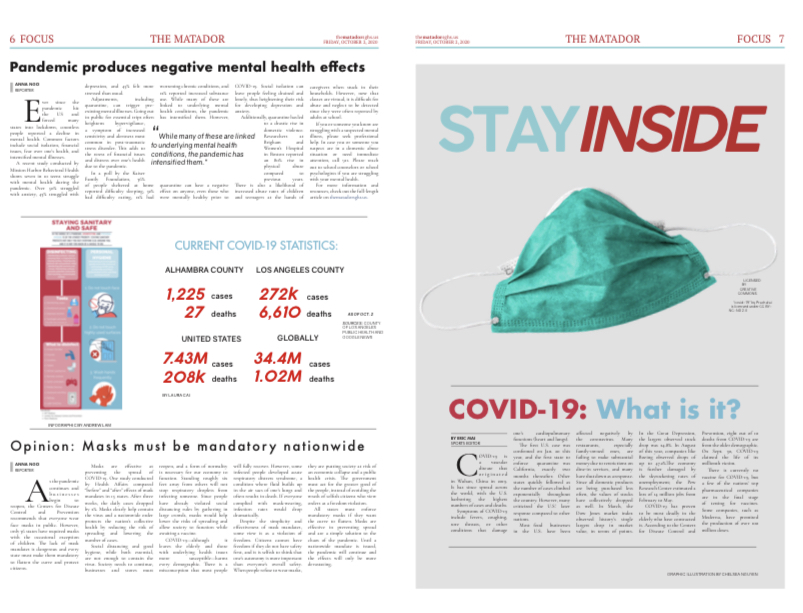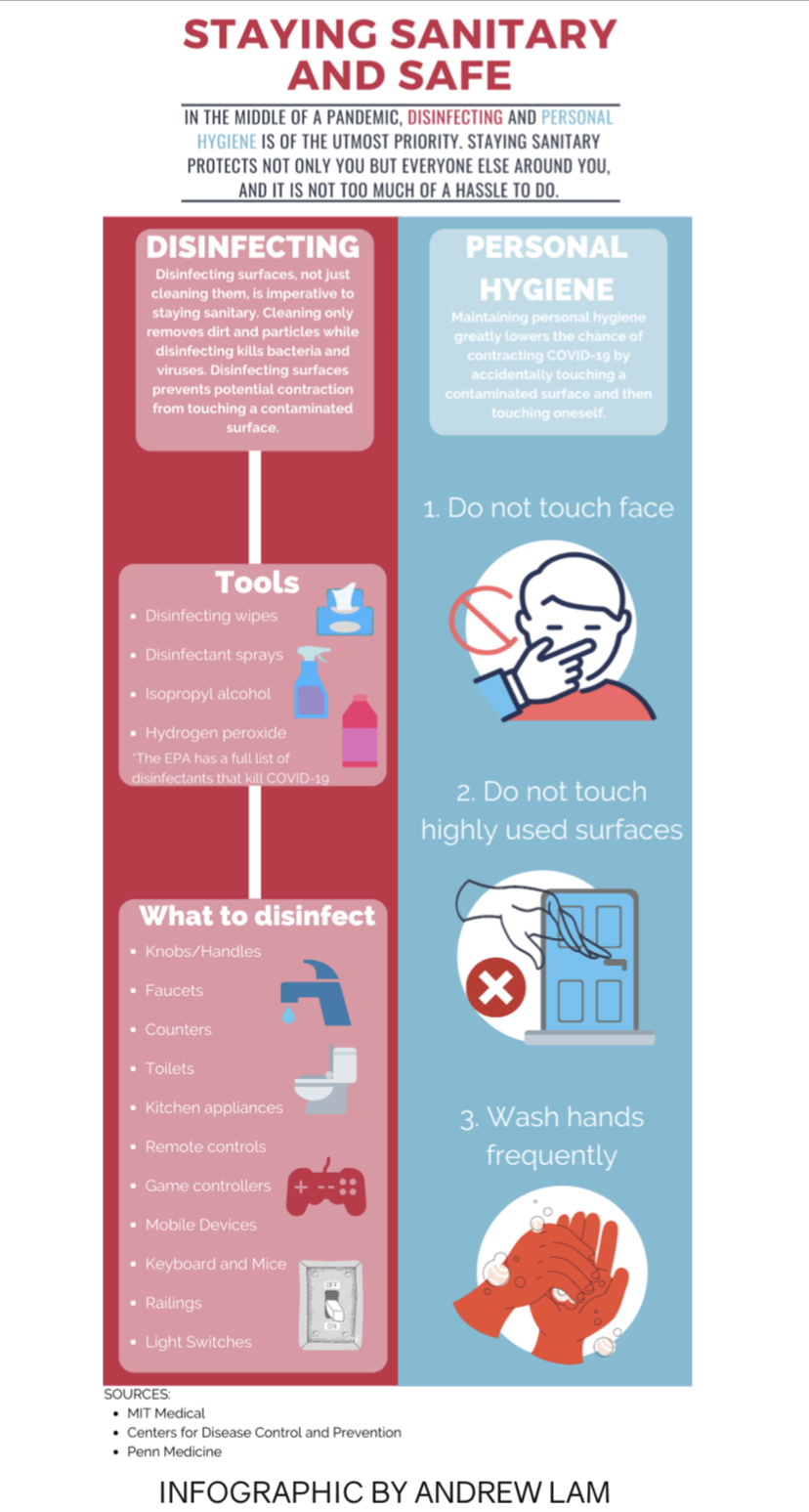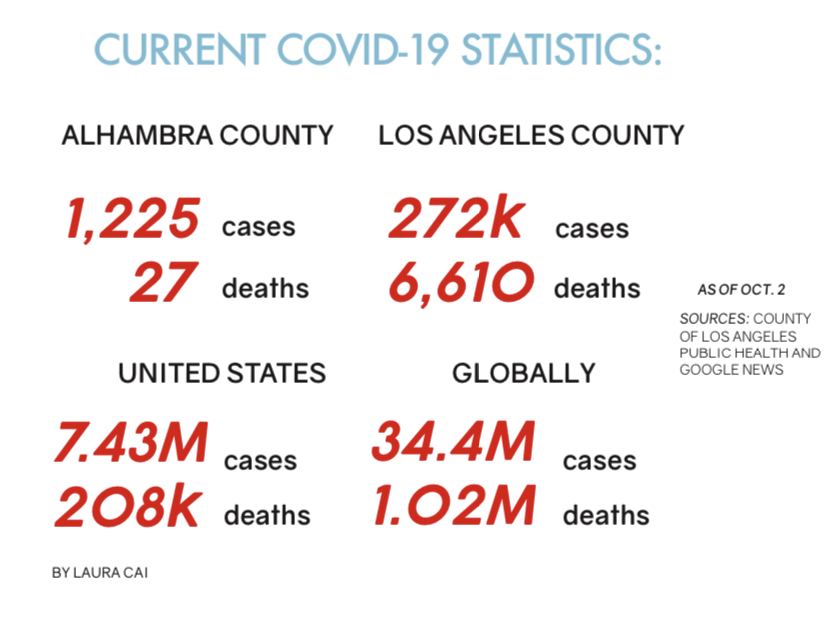
Stay Inside
Pandemic produces negative health effects
by Anna Ngo
Ever since the pandemic hit the US and forced many states into lockdown, countless people reported a decline in mental health. Common factors include social isolation, financial issues, fear over one’s health, and intensified mental illnesses.
A recent study conducted by Mission Harbor Behavioral Health shows seven in 10 teens struggle with mental health during the pandemic. Over 50% struggled with anxiety, 43% struggled with depression, and 45% felt more stressed than usual.
Adjustments, including quarantine, can trigger pre-existing mental illnesses. Going out in public for essential trips often heightens hypervigilance, a symptom of increased sensitivity and alertness most common in post-traumatic stress disorder. This adds to the stress of financial issues and distress over one’s health due to the pandemic.
In a poll by the Kaiser Family Foundation, 36% of people sheltered at home reported difficulty sleeping, 32% had difficulty eating, 12% had worsening chronic conditions, and 12% reported increased substance use. While many of these are linked to underlying mental health conditions, the pandemic has intensified them. However, quarantine can have a negative effect on anyone, even those who were mentally healthy prior to COVID-19. Social isolation can leave people feeling drained and lonely, thus heightening their risk for developing depression and anxiety.
Additionally, quarantine has led to a drastic rise in domestic violence. Researchers at Brigham and Women’s Hospital in Boston reported an 80% rise in physical abuse compared to previous years. There is also a likelihood of increased abuse rates of children and teenagers at the hands of caregivers when stuck in their households. However, now that classes are virtual, it is difficult for abuse and neglect to be detected since they were often reported by adults at school.
If you or someone you know are struggling with a suspected mental illness, please seek professional help. In case you or someone you suspect are in a domestic abuse situation or need immediate attention, call 911. Please reach out to school counselors or school psychologists if you are struggling with your mental health. Resources are listed below.
Resources:
SAMHSA National Treatment Referral Helpline
https://www.samhsa.gov/find-help/national-helpline
1-800-662-HELP (4357)
Crisis Text Line
https://www.crisistextline.org/
Text HOME to 741741
National Suicide Prevention Lifeline
1-800-273-8255
National Domestic Violence Hotline
1-800-799-7233
Text LOVEIS to 1-866-331-9474
Opinion: Masks must be mandatory nationwide
by Anna Ngo
As the pandemic continues and businesses begin to reopen, the Centers for Disease Control and Prevention recommends that everyone wear face masks in public. However, only 36 states have required masks with the occasional exception of children. The lack of mask mandates is dangerous and every state must make them mandatory to flatten the curve and protect citizens.
Masks are effective at preventing the spread of COVID-19. One study conducted by Health Affairs compared “before” and “after” effects of mask mandates in 15 states. After three weeks, the daily cases dropped by 2%. Masks clearly help contain the virus and a nationwide order protects the nation’s collective health by reducing the risk of spreading and lowering the number of cases.
Social distancing and good hygiene, while both essential, are not enough to contain the virus. Society needs to continue, businesses and stores must reopen, and a form of normality is necessary for our economy to function. Standing roughly six feet away from others will not stop respiratory droplets from infecting someone. Since people have already violated social distancing rules by gathering in large crowds, masks would help lower the risks of spreading and allow society to function while awaiting a vaccine.
COVID-19—although it leaves the elderly and those with underlying health issues more susceptible—harms every demographic. There is a misconception that most people will fully recover. However, some infected people developed acute respiratory distress syndrome, a condition where fluid builds up in the air sacs of one’s lungs and often results in death. If everyone complied with mask-wearing, infection rates would drop dramatically.
Despite the simplicity and effectiveness of mask mandates, some view it as a violation of freedom. Citizens cannot have freedom if they do not have safety first, and it is selfish to think that one’s autonomy is more important than everyone’s overall safety. When people refuse to wear masks, they are putting society at risk of an economic collapse and a public health crisis. The government must act for the greater good of the people, instead of avoiding the wrath of selfish citizens who view orders as a freedom violation.
All states must enforce mandatory masks if they want the curve to flatten. Masks are effective in preventing spread and are a simple solution to the chaos of the pandemic. Until a nationwide mandate is issued, the pandemic will continue and the effects will only be more devastating.
COVID-19: What is it?
by Eric Mai
COVID-19 is a vascular disease that originated in Wuhan, China in 2019. It has since spread across the world, with the U.S. harboring the highest numbers of cases and deaths.
Symptoms of COVID-19 include fevers, coughing, sore throats, or other conditions that damage one’s cardiopulmonary functions (heart and lungs).
The first U.S. case was confirmed on Jan. 20 this year, and the first state to enforce quarantine was California, exactly two months thereafter. Other states quickly followed as the number of cases climbed exponentially throughout the country. However, many criticized the U.S.’ later response compared to other nations.
Most food businesses in the U.S. have been affected negatively by the coronavirus. Many restaurants, especially family-owned ones, are failing to make substantial money due to restrictions on dine-in services, and many have shut down as a response. Since all domestic products are being purchased less often, the values of stocks have collectively dropped as well. In March, the Dow Jones market index observed history’s single largest drop in market value, in terms of points. In the Great Depression, the largest observed stock drop was 24.8%. In August of this year, companies like Boeing observed drops of up to 47.2%.The economy is further damaged by the skyrocketing rates of unemployment; the Pew Research Center estimated a loss of 14 million jobs from February to May.
COVID-19 has proven to be most deadly in the elderly who have contracted it. According to the Centers for Disease Control and Prevention, eight out of 10 deaths from COVID-19 are from the older demographic. On Sept. 30, COVID-19 claimed the life of its millionth victim.
There is currently no vaccine for COVID-19, but a few of the nations’ top pharmaceutical companies are in the final stage of testing for vaccines. Some companies, such as Moderna, have promised the production of over 100 million doses.
Infographic: Staying sanitary and safe
by Andrew Lam

Current COVID-19 statistics
by Laura Cai
